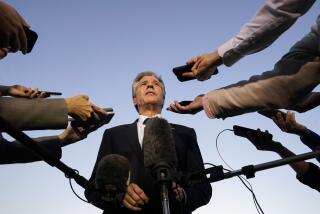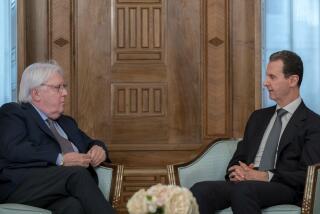Divisions Weaken Arab Voice
- Share via
CAIRO — Arab officials again demonstrated that their countries are united more by a common faith and language than by mutual interest when they failed Sunday night to set a date for an emergency summit to pressure the United States not to attack Iraq.
The officials’ inability to agree was the more surprising given the unanimity in this region about the damaging effects that an American war with Iraq would have on the economic well-being of each nation.
Only a day earlier, Egyptian President Hosni Mubarak had announced that an emergency gathering of the League of Arab States would be held in the Red Sea resort of Sharm el Sheik before the end of the month. But the wrangling among Arab League foreign ministers meeting here to discuss what was initially portrayed as a fait accompli revealed deep differences about how to head off a conflict.
One faction at the meeting, led by Syria, argued that Washington must do more to avoid a war, while the other, including Egypt, said the onus rests primarily on Iraq.
“If it is a summit that’s going to say no to war ... then let it be,” said Syria’s ambassador to the Arab League, Youssef Ahmed. “But if it’s a meaningless summit, it will be a disaster for the Arab nation.”
Gathered under the auspices of the Arab League, a 22-member group that has tried since 1945 to unite a disparate community into an influential regional bloc, the foreign ministers did manage to agree on a joint statement that responded to the two main factions: It condemned any unilateral action against Iraq and called on Baghdad to abide by United Nations resolutions requiring it to cooperate with weapons inspectors. But that statement highlighted the verbal two-step the ministers relied on to conceal their differences.
The second point in the communique, which was adopted unanimously, said all Arab states will abstain from offering “any sort of military assistance to any military action that would constitute a threat to the peace or security of Iraq or the unification of its land.”
But the Sudanese foreign minister, Mustafa Osman Ismail, later explained that “military assistance” does not include allowing U.S. forces to set up bases, as they have in Kuwait and Qatar, for example.
Sunday’s communique might have added to the diplomatic pressure placed on Washington by France and Germany because of the Bush administration’s apparent readiness to resort to the military option in the standoff with Iraq. Instead, the statement served as a reminder that when it comes to the Arab leadership, the U.S. knows pretty much what it can expect from each player.
“There is a very thin line of agreement, at least in public, that none of them is sponsoring an attack on Iraq,” said Abdel Moneim Said, director of the Al Ahram Center for Political and Strategic Studies, a government-funded think tank based here.
For Mubarak, indeed for all Arab leaders, reports of the chaotic session Sunday are certain to increase concern about deepening public anger and frustration at the way the Arab leadership has failed to champion popular causes. Even before the Iraq crisis broke, there was a general sense in the region that its leaders are powerless to end -- or worse, willing to turn a blind eye to -- the Israeli-Palestinian conflict.
Now, with the world’s attention on Iraq, the Arab leadership is not only the object of widespread scorn for not standing up to the U.S. -- it is also being ridiculed. Many here have started to ask how it is that Arab leaders have not at least matched the rhetorical efforts of Europeans to try to slow the drumbeat toward war.
“The French president -- who puts himself in the face of an American tempest, jeopardizing his country’s interests and maybe the entire European Union’s -- will never find a single supporter among Arab leaders, because they have all made up their mind,” said an editorial Saturday in Al Quds al Arabi, a pan-Arab newspaper published in London. “They decided not to upset President Bush, hoping to avoid his punishment.”
On Saturday, when millions of antiwar protesters turned out around the world, small groups also took to the streets of Cairo. Their anger quickly focused on this very issue.
“Arab governments are cowards!” chanted a small crowd that paraded out of the Sayeda Zeinab Mosque in Cairo.
At a separate rally on the banks of the Nile, Essam Eryan, a member of the banned Muslim Brotherhood, said it is time for Arab leaders to make a stand.
“Kicking out American troops, closing Arab air, water and land in the face of the invading troops,” he said. “That should be the resolution we expect.”
But although the Arab League officials came together in part to address, and perhaps neutralize, some of those feelings, the participants appeared reluctant to deal with them from the start of their weekend gathering, which began with informal discussions Saturday night.
Even the league’s secretary-general, the always outspoken Amr Moussa, appeared detached. At an earlier such meeting, he had predicted that a U.S. invasion of Iraq would “open the gates of hell.” This time he said: “The meeting did not fail. There was a lot of heated discussion.”
Greece, which currently holds the rotating presidency of the European Union, believes that U.N. arms inspectors have created maneuvering room in the crisis over Baghdad’s alleged weapons of mass destruction, and a Greek representative who came here, Foreign Minister George Papandreou, urged Arabs to make an overture to Iraq.
Arab and European states, though, are divided on what to do about the standoff.
Sunday’s session began with a statement by Lebanese Foreign Minister Mahmud Hammud, who like Mubarak said that although the Arab nations may not be able to avert a war, they can at least take a strong stand against one.
“Escalating preparations for attacking Iraq will have consequences not only for the Iraqi people but on the social, political and human level for the entire region,” Hammud said. “ ... Arab countries alone might not prevent a war against Iraq, but we could take steps toward preventing a war.”
Papandreou addressed a closed-door meeting of the foreign ministers and said later that he had urged them to try to persuade Iraqi President Saddam Hussein to fully, and quickly, provide answers to any questions posed by U.N. weapons inspectors.
There was even some talk of an Arab League delegation being dispatched to Baghdad to try to prevail upon the Iraqi government to cooperate completely with the U.N. But by Sunday night, there was no longer any talk, at least in public, of such a delegation. Instead, it was of conflict among participants at the meeting.
The Arab League is scheduled to hold a summit at the end of March, but Mubarak called on the members’ heads of state to come together much sooner “in order to agree on a unified position to let our voice be heard and influence the decision makers to solve the situation peacefully.”
There may even still be an emergency summit. Although prospects for such a meeting appear bleak, the public mood may require that the leaders make a show of a unified stance.
*
Jailan Zayan of The Times’ Cairo Bureau contributed to this report.
More to Read
Sign up for Essential California
The most important California stories and recommendations in your inbox every morning.
You may occasionally receive promotional content from the Los Angeles Times.













